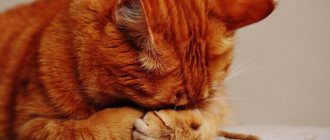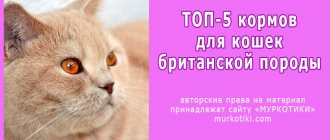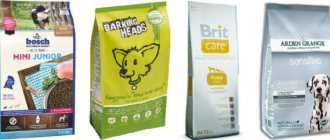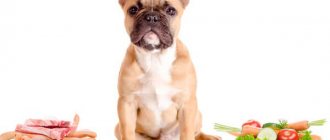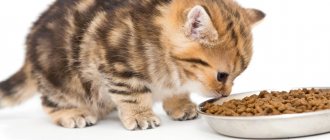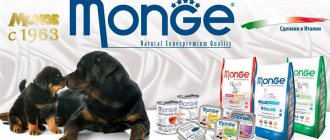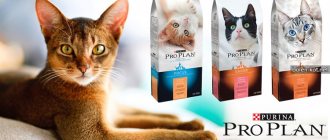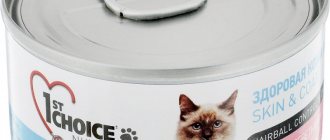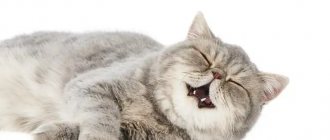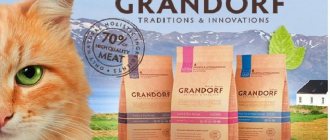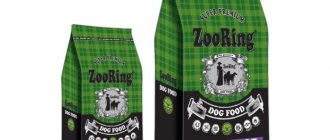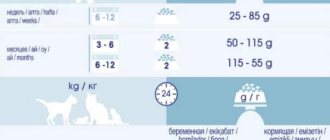Eating food is vital for all living things in the world, including British cats. Therefore, this issue should be taken quite seriously. Poor nutrition often leads to chronic diseases.
All dry cat food can be divided into categories:
- Economy class
- Premium class
- Super premium class
- Holistics
When choosing food for the British, give your preference to premium and super-premium food, you can use holistic products.
ECONOMY CLASS FOOD FOR CATS
Food that should not be fed to animals (economy class):
- Whiskas
- Friskies
- Kitekat
- Felix
- Our brand
There is nothing healthy in these foods. They are comparable to chips for humans. They contain very few nutrients and elements for the full development of a British kitten and the functioning of the adult body as a whole, if you analyze their composition, they contain a lot of corn flour. In addition, there are many additives that cause allergies. Because of this, more of this food is needed to satiate in order to get a sufficient amount of calories, and calories are energy, fuel for the body.
PREMIUM FOOD FOR BRITISH CATS AND KITTENS
Premium food:
|
|
PREMIUM FOOD: WHAT ARE THEY GOOD?
What are the benefits of premium food? - They always contain a source of protein. It could be chicken, chicken protein, corn gluten. Chicken can be not only meat, but also its other processed parts. Corn, rice and wheat are sources of carbohydrates. The feed always contains the required amount of microelements and vitamins. Often in the composition you can see such a name as “tocopherols” - a preservative (even rosemary is included in the composition), it is an antioxidant. Don't be alarmed, these substances are natural and there is nothing bad in them, they are not chemical preservatives, which are not a natural product.
You shouldn't always pay attention to advertised brands. There are foods of excellent composition at a good price, however, we have not heard their names. Above is a list that will help you verify this. Conclusion: do not be guided by the price, be guided by the composition.
SUPER PREMIUM FOOD FOR BRITISH CATS AND KITTENS
Super premium food:
|
|
SUPER PREMIUM FOOD: WHAT ARE THEY GOOD?
Super premium food contains more meat. More often it is even two types of meat, for example, turkey, chicken. The carbohydrates most often included are rice and rice bran; there is no corn flour. Again, we see tocopherols as preservatives and antioxidants (remember that this is a natural composition). Tocopherols are chemical compounds that are biologically active; in other words, they are vitamin E. In the composition we usually see them like this:
- E306 (mixed tocopherols)
- E307 (α-tocopherol)
- E308 (γ-tocopherol)
- E309 (δ-tocopherol)
Well, and, of course, we see an even richer and more extensive list of minerals and vitamins, even compared to premium foods.
HOLISTIC FOOD FOR BRITISH CATS
List of holistic foods for cats:
|
|
WHAT ARE HOLISTICS GOOD?
This is high quality food and belongs to the super premium line. Contains natural meat, vitamins, minerals, and other beneficial additives. You will not find any artificial additives in the holistic product.
Holistic food should contain only natural proteins, fats, additives - dried fermentation products (probiotics), Omega acids, minerals and vitamins. If there are strange additives in the food, then this food is not considered holistic.
I would not separate these foods into a separate class, but food manufacturers increasingly want to emphasize the natural composition by mentioning the word “holistic” right on the packaging. In my opinion, this is nothing more than just a publicity stunt. However, the composition still really meets the declared quality.
Treats for the British
To reward a British cat for good behavior or simply to pamper it, owners use special treats.
Treats are divided into several types:
- preventive – prevent various diseases, cleanse the stomach of hair, prevent the formation of tartar;
- vitamin – enriched with useful substances, replenishing the deficiency of vitamins and minerals;
- nutritious – treats with increased nutritional value;
- for encouragement - they give the cat new taste sensations and are used as praise.
On the packaging, manufacturers must indicate the age at which the treat can be given, the recommended portion and composition.
The delicacy can be in the form of sausages, slices, crispy pads, sticks, cream, etc. Manufacturers offer a wide range of flavors based on natural ingredients.
Popular brands:
- Gimpet;
- Almo Nature;
- Dezzie;
- Orijen;
- Beaphar;
- Country delicacies.
It is not so important whether the owner feeds the British cat natural food or industrial food. The main thing is that the food is of high quality, fresh and balanced
Then the pet will live a long and happy life.
I like3I don't like1
Hill's Nature's Best™ With Real Chicken Adult Cat
Hill's Pet Nutrition has been caring for pets since 1939. Its main mission is to develop food for veterinary use. That is why veterinarians around the world most often recommend Hills's brand food.
Nature's Best With Real Chicken Adult Cat is a carbohydrate-containing food suitable for all adult cats, particularly British cats.
The food consists of high-quality natural ingredients with the addition of vitamins and minerals, taurine to support normal heart function and retinal function. Contains Omega-3 and Omega-6 fatty acids for healthy skin and a shiny coat.
Ingredients: chicken, chicken liver, egg powder, oat fiber, brewer's rice, peas, carrots. Contains cornmeal and wheat
Should be given with caution - it promotes rapid weight gain. The food is enriched with vitamins and minerals
Advantages: designed specifically for adult cats and cats over 1 year old. Has a gentle effect on the digestive system. It has a natural taste that your pet will love. There are no ingredients that can cause gastrointestinal disorders or skin diseases. Ideal balance of nutrients.
Disadvantages: contains wheat and corn gluten - may cause allergies. There are also food colorings.
Earthborn Holistic, Primitive Feline Natural Cat Food
Earthborn Holistic, Primitive Feline Natural Cat Food is a grain-free food produced by Midwestern Pet Foods in the USA. This high-quality product is created for cats of all age categories. It meets all the special needs of an adult cat and provides them with decent, high-calorie nutrition. A healthy combination of high quality protein and vitamins E and C, which are found in vegetables and fruits, have a beneficial effect on the immune system and the functioning of the body as a whole.
Ingredients: egg, chicken and turkey flour, herring flour, rich in vitamins and Omega 3-6-9 acids, brown rice, flaxseed, rolled oats are used as a source of carbohydrates and do not cause allergies. The food is enriched with 30 mineral and vitamin supplements. The presence of calcium and phosphorus guarantees the strengthening of your pet’s bones and teeth.
Has a mild odor. Convenient granules, the food is suitable for feeding kittens and nursing cats.
Advantages: it contains quite a lot of proteins, this includes proteins of both animal and plant origin, which is very suitable for the lean muscle mass of a cat. No grains or gluten. The ideal high-protein, grain-free diet for cats.
Disadvantages: high cost.
Bosch Sanabelle Grande
Dry food and treats for British cats Sanabelle (Sanabel) are produced in Germany by Bosch Tiernahrung GmbH & Co. These feeds are positioned as a super-premium class. All ingredients are certified as suitable for human consumption by the European Union. The feed does not contain cheap fillers, chemical preservatives, dyes, flavoring additives or soy protein.
Bosch professional food is the ideal nutrition for your pet, and for you - a pleasant price ratio and unsurpassed German quality.
Composition: 31% protein is found in liver, poultry meat, meat flour, salmon meal. Rice, yellow millet and sorghum are used as carbohydrate sources. Mussel meat is a source of glucosamine and chondroitin, which are essential for healthy joints. Blueberries, cranberries and fish oil are used as vitamin supplements. Mineral additives: calendula extract, dried brewer's yeast, chicory root. Yucca extract helps reduce stool odor.
Advantages: a composition with a reduced mineral content reduces the risk of developing urolithiasis. There is zinc, which helps improve the health of the coat. Large granules that can be used to sharpen your teeth. Cats usually like it.
Disadvantages: the antioxidant in the composition is not specified.
How to feed a cat when it is sick
The British, although known for their excellent health, have their Achilles heel. Even a few. These are their signature ailments that can be combated with a well-designed diet:
- If you have urolithiasis, you should consider reducing the composition of minerals. Pets who eat dry food often fall into the mineral risk zone. The food was probably chosen incorrectly. Therefore, it is imperative to ensure that there is no such harmful component in the composition. There must be clean, fresh water in the bowl - without this, you can forget about ridding your cat of kidney stones.
- With hypertrophic cardiomyopathy, it is advisable to take a closer look at the amount of salt absorbed by your pet. The less salt the better for the fluffy core. Previously, there was an opinion that such animals should consume less protein. This point of view can hardly be called correct, since as a result the animal lost a lot of muscle mass. As a result, they lived fewer years than they could have.
The British cat is extremely prone to obesity. We can say that she is the Achilles heel of furry companions. But well-chosen food will help avoid such troubles. Like many others.
Previous British catsDiseases in British cats and kittens - symptoms and solutions Next British catsCare and maintenance of the British cat breed
Prohibited Products
British cats should not be fed the following foods:
- fatty meat;
- bones;
- river fish;
- fatty fermented milk products;
- egg white;
- sausages;
- conservation (for people);
- fried foods;
- spicy and salty foods;
- sweets, chocolate;
- baking, baked goods;
- food from your table.
The right approach to feeding a British breed cat is the key to good health and long life for a furry family member!
For spayed and neutered
Royal Canin Male for the prevention of urolithiasis
pros
- Good coat condition
- No side effects
- Disease Prevention
Minuses
High price
From 313 RUR
Dry food for castrated British cats from 1 year to 6 years. The product prevents the occurrence of urolithiasis and obesity. Veterinarians advise owners to feed their pets with food from this series after operations related to sterilization. Based on nutrition, problems of the gastrointestinal tract are solved: cats with sensitive stomachs stop regurgitating. An excellent option for cats after castration; in most cases, urolithiasis does not develop.
Bozita for the prevention of urolithiasis, with chicken
pros
- Affordable price
- Increased fiber content
- Contains fresh meat
- Practical packaging
- The packaging does not allow the smell to dissipate
- Suitable for older cats
- Contains a natural immunostimulant
Minuses
Not found
From 358 ₽
The product is suitable for indoor and adult cats from 1 to 6 years of age. The food is selected taking into account the age characteristics of sterilized and elderly cats. Chicken meat in the diet is easily digestible, L-Carnitine normalizes the metabolism of sedentary animals. The dry product boosts the cat's immunity.
TRAINER Natural Adult cat Sterilized White Fresh Meats dry (0.3 kg)
pros
- Rich composition
- Animal care
- Shiny wool
- Contains flaxseed
- Calms the animal
Minuses
Expensive product
From 333 ₽
Premium quality food combines two types of meat, chicken, turkey and fish (salmon powder). Suitable for use by all types of breeds. Mint extract relaxes your pet. The vitamins and minerals in the complex will provide the necessary elements to maintain health.
Dry food
From three months of life, you can gradually introduce dry food into the bait, increasing its quantity slightly every month. When choosing food, you need to take into account that it must fully satisfy the needs of the pet. Veterinarians advise paying attention to premium, super premium and holistic food classes. 1st Choice, Hill's, Optimal, and imported Royal Canin food brands are excellent. Buy food that is appropriate for the kitten's age.
Some examples of good food:
- Royal Canin British Shorthair Kitten food has been developed for British babies up to 12 months. The convenient shape of the granules is suitable for very small kittens to chew on. Vitamin complexes improve immunity, and easily digestible proteins improve the digestive system.
- Brit Care Cat Crazy I am Kitten is a completely hypoallergenic food consisting of chicken and rice. Positively affects the digestive system. The composition includes dried apples and sea buckthorn: sources of vitamins necessary for the immune system.
- Acana Pacifica Cat is a unique hypoallergenic super premium food. Contains no grains. 75% consists of different types of fresh ocean fish. Also contains fruits, vegetables, medicinal herbs. The food contains a high percentage of digestible protein. Improves coat, teeth, strengthens bones. The best option for British cats.
How to feed a cat when it is sick
The British, although known for their excellent health, have their Achilles heel. Even a few. These are their signature ailments that can be combated with a well-designed diet:
- If you have urolithiasis, you should consider reducing the composition of minerals. Pets who eat dry food often fall into the mineral risk zone. The food was probably chosen incorrectly. Therefore, it is imperative to ensure that there is no such harmful component in the composition. There must be clean, fresh water in the bowl - without this, you can forget about ridding your cat of kidney stones.
- With hypertrophic cardiomyopathy, it is advisable to take a closer look at the amount of salt absorbed by your pet. The less salt the better for the fluffy core. Previously, there was an opinion that such animals should consume less protein. This point of view can hardly be called correct, since as a result the animal lost a lot of muscle mass. As a result, they lived fewer years than they could have.
The British cat is extremely prone to obesity. We can say that she is the Achilles heel of furry companions. But well-chosen food will help avoid such troubles. Like many others.
Menu for the week: what to feed your cat
1. Meat (pork is not recommended). If raw, then only after freezing. Do not share with chicken, because... Chicken protein causes allergies in the form of hair loss. Vary different types of meat.
2. Offal - after defrosting or stewed. No more than once a week.
3. Fish - without bones and only thermally processed. 1 time per week. More often it is not necessary, because it provokes urolithiasis.
4. Egg yolk - in any form, 1 time per week.
5. Fermented milk products - any that the cat likes
Give milk with caution from the 4th month of a kitten's life, because... As the body ages, it stops accepting lactose.
Milk can cause diarrhea.
6. Hard cheese - once a week.
7. Porridge - rice, semolina. Sugarless. If the cat eats buckwheat, you can eat it too. Any porridge that your pet eats. Can be mixed with egg or meat. 1 part porridge, 2 parts meat.
8. Baby food in the form of meat puree - once a week. Recommended up to 8 months.
9. Grass - purchased or grown. DO NOT bring grass from the street, because... it may contain infections from infected animals and worm eggs.
10. Brewer's yeast - add to food 3 times a week.
11. Vegetable oil - no more than 2 teaspoons per day.
12. Water is always fresh, only bottled, in sufficient quantity, at room temperature.
13. Vitamins for cats or kittens - depending on age.
1. Pork, lamb, duck.
2. Sweet fruits.
3. Vitamins intended for people - because. dosage is calculated by weight.
4. Sweets.
5. Potatoes.
6. Salty, seasoned and smoked foods.
7. Canned food for people.
Feeding a British baby at 2 months
The first month of the furry baby's life has passed. His body now requires additional elements. Before feeding a 2-month-old British breed kitten, you need to study the list of acceptable foods necessary for proper growth and development.
Your baby's diet should also include:
- fresh milk;
- delicious milk porridges cooked with low-fat milk;
- natural soft cheese;
- low-fat cream;
- egg yolk;
- fresh cottage cheese.
You can supplement the menu with pates and canned food purchased from specialized pet stores or veterinary pharmacies. The manufacturer's recommendations regarding age restrictions must be indicated on the packaging.
Experienced breeders do not advise buying cheap products of questionable quality. If you want to pamper your furry baby, buy him a good product from a reliable manufacturer!
- when introducing new foods into your lop-eared pet’s diet, monitor his body’s reaction;
- do not exceed the permissible limits when feeding the baby, overeating can be fraught with consequences;
- Don’t be lazy to cook separately for a purebred cat; he should not eat food with seasonings, spices and other additives typical of foods consumed by humans.
Now you know what to feed domestic British kittens at 2 months, and the next stage of life, new discoveries and an expanded diet are ahead!
What to feed a British kitten
For the first month after birth, a Briton feeds exclusively on mother's milk. It provides babies with all the necessary substances and promotes the formation of strong immunity.
If there is no mother, British kittens should be fed with cat milk substitutes, which are sold in veterinary pharmacies. It is not recommended to give baby food. It is designed for people, not animals.
A one-month-old kitten begins to be fed breast milk in the intervals between meals. The baby is carefully introduced to solid food so that at 2-3 months he is ready to move to a new home.
An approximate feeding schedule for a British kitten by age is presented in the table.
| Age | Number of feedings per day | Diet |
| British kittens: 1 month | 3-5 | · small pieces of beef; · porridge with milk; milk for kittens |
| British kitten: 2 months | 6-8 | · small pieces of beef; · low-fat cottage cheese; · porridge with milk; milk for kittens |
| British kitten: 3 months | 6 | from three months, chicken, vegetables and egg yolk are introduced into the diet, and milk for kittens is replaced with goat or cow milk; other products remain unchanged: pieces of beef; · porridge with milk; · low-fat cottage cheese |
| British kitten: 4-6 months | 5 | A British kitten at 4 months is gradually weaned off whole milk and switched to fermented milk products, the diet is enriched with: · offal; · boiled sea fish; · fruits |
| British kitten: 6-10 months | 3-4 | · all types of lean meat; by-products; · porridge; · vegetables, fruits, herbs; · dairy products; · eggs; boiled sea fish |
From 10-12 months, British kittens are fed twice a day. Now they eat the same foods as adult cats.
An alternative option is to use ready-made feed. Canned food and dry granules can be given to a small kitten of two months. The “drying” is soaked in water or milk so that the baby can chew it.
Gradually increase the proportion of dry food in the diet and reduce the amount of wet food:
- British: 3 months – 90% wet/10% dry;
- British: 4-6 months – 70-80% wet / 20-30% dry;
- British: 6-10 months – 60-70% wet / 30-40% dry;
- British: 10-12 months – 50-60% wet / 40-50% dry.
From the age of one year, the pet is given 30% wet food and 70% dry food. It is desirable that the products are from the same manufacturer. This minimizes the risk of digestive problems and allergic reactions.
The daily feeding rate for a British kitten is about 10% of its weight. When feeding dry food, follow the manufacturer's recommendations.
Feeding a British baby at 1 month
Any living creature needs breast milk after birth, and the British baby is no exception. In the first month of life, a cat should be under the reliable care of its mother cat. Her milk contains all the components necessary for growth and development.
This is interesting: How to Roast Pumpkin Seeds in a Frying Pan
During this period, it is important to provide the cat with proper nutrition so that the remaining milk can receive all the necessary substances, thanks to which the kitten will develop a strong immune system.
If the nurse has some health problems, or for some reason the kitten cannot be under the care of the parent, the owners of a furry pet should develop a healthy diet for the newborn. So, what to feed a British kitten in the first month of life:
- In pet stores you need to purchase special milk for newborn kittens. This product contains a correctly selected composition of components, close to breast milk.
- Gradually, mashed egg whites and liquid semolina porridge cooked in skim milk can be added to the diet. Portions should be minimal. The number of feedings per day is 3-4 times. These foods are also included in the diet of breastfed kittens.
How to create a balanced diet?
Each owner decides for himself whether his pet will eat only dry or wet food, and in what proportion the dishes will be combined. Standard options: 50/50, 70/30, 60/40%. In any case, the animal should always have access to clean water. And food should be poured into the bowl only during feeding - the rest of the time it should be clean. To create a balanced diet, you can follow the example of experienced breeders who recommend:
- alternate feeding with dry and wet food (in the morning it is better to introduce soft pieces in sauce or canned food into the diet, then feeding continues with dry food);
- You should regularly offer the animal meat cut into small pieces;
- You should not skimp on food for a purebred or elite animal, as this will lead to a deterioration in its health.
What to feed a British kitten
A complete and maximally balanced diet for a domestic British cat at any age can guarantee a long and healthy life for your four-legged pet.
Diet in the first month
Kittens need special and properly selected nutrition, which is due to the peculiarities of the digestive system, which is not suitable for eating adult animals. A small kitten has special needs for proteins and carbohydrates, and also differs from an adult animal in metabolism and peristalsis.
Until the age of two months, a small kitten needs to be fed approximately five to six times a day. The diet should include lean beef or chicken, frozen or scalded, scraped or ground in a blender. Experts and veterinarians do not recommend getting carried away with meat, and advise giving preference to special milk formulas adapted for feeding young kittens.
Diet from one month to six months
From about two months, the kitten is transferred to four feedings a day. Starting from the age of three months, you need to start giving the animal finely chopped, rather than minced meat. Boiled meat must be processed into puree or minced meat.
It is advisable to start introducing complementary foods with boiled vegetables, which are mixed with chopped meat. Then boiled sea fish, cleaned of bones, is introduced. Low-fat cottage cheese, which is given in small portions every day, is very useful for kittens of this age. Up to six months, the diet must include milk and not too sour kefir, as well as quail eggs.
Diet from six months to a year
It is recommended to gradually transfer a six-month-old British kitten to three meals a day, and from eight months, food is given only a couple of times a day. At this age, the amount of milk gradually decreases and the amount of fermented milk products increases.
An irreplaceable source of vitamins is special cat grass, which can be purchased ready-made or grown independently in a flower pot on the windowsill. It should be remembered that the animal must have free access to fresh and clean water at all times.
Why specialized food?
Kittens of the British breed grow and develop for quite a long time, on average up to 4-5 years. This means that during this period the owner of the animal must provide him with the most complete diet with all the necessary vitamins and microelements.
In addition, the British are prone to excess weight , and frequent visits to various exhibitions require them to be in shape. This is another argument in favor of properly selected nutrition for these short-haired kittens.
Feeding rules
When caring for representatives of the British breed, their characteristics should be taken into account. By following a few simple feeding rules, you will ensure your pet has a long and healthy life.
- The main rule for fold-eared cats: nutrition should be appropriate for their age. For different age groups, certain types of food are preferable: wet, dry or canned, taking into account the need for microelements. This must be taken into account when choosing food.
- Experts do not recommend buying economy class food . Their composition can harm the already poor health of the kitten. The best choice would be to purchase specialized premium or super premium lines.
- Among all diets, choose the one that is most appropriate for the age of the animal.
- Follow the feeding schedule and norms .
- It is not recommended to mix natural food with prepared food . Also, you should not feed the British by giving him human food.
- To improve digestion, as well as remove hair from the stomach, your pet needs to be provided with special grass . Some feeds include it, but in other cases you need to grow it yourself or buy it at a veterinary pharmacy.
- Your pet should always have access to fresh drinking water , which should be changed at least once a day.
Should vitamins be added to the British diet?
Vitamins, interval complexes and other biological supplements must be included in the diet of a cat that is on a natural diet. Conventional products do not contain enough useful elements, so compensation is required. The need for vitamins in the British also increases during the growth period (from 3 to 6 months), during pregnancy and lactation, after surgery or a serious illness. Cats of this breed most often lack vitamin B, so it is necessary to purchase medications that contain it.
Useful vitamins for British cats:
- Vitamins Kitzim. They are made in the UK, contain magnesium, calcium, phosphorus, iron, taurine, B vitamins. Can be used for kittens, pregnant and lactating cats, and adult animals.
- Beaphar. This is a food supplement with biotin and taurine for adult cats produced in Holland. Contains B vitamins, as a result of which it has a positive effect on the animal’s fur, preventing its loss.
- Canina. These vitamins are produced in Germany and contain biotin, phosphorus, calcium and fiber, vitamins B12 and A. They are used in adult and elderly cats and kittens to prevent skin problems.
- Omega Neo is a domestic product. The tablets contain essential fatty acids omega-3, omega-6, vitamins A, B, E, taurine. Used to improve the functioning of the gastrointestinal tract and prevent joint diseases in adult cats.
- Veda Biorhythm - Russian vitamins developed specifically for kittens. They are used during the growth period as they improve the absorption of nutrients. Veda Biorhythm contains B vitamins, L-carnitine, taurine.
Do not forget that in most cases, vitamin and mineral complexes are taken in a course of 1–3 months. This allows you to create a depot of active components in the cat’s body. Longer use may lead to undesirable consequences. One of my colleagues, who got a British cat, purchased several different vitamin supplements at once on the advice of a veterinarian. She regularly added them to her pet’s food for six months
Gradually, the owner noticed a change in the pet’s appearance and behavior. He became more inhibited and aggressive, his fur looked unkempt
The woman took the cat to a veterinary clinic, where doctors diagnosed hypervitaminosis due to the abuse of biological additives. After stopping the pills, the animal immediately began to feel better.
Rating leaders
As a result of strict selection, the rating consists of only 5 foods. Even though I wanted to, I couldn’t get more, because... There are very few worthy products on the CIS market. If you search in foreign countries, you can find more, but these brands are not available to our cats, because... Nobody supplies them yet.
Please note that each rating place is assigned not to the manufacturer or brand as a whole, but to a specific modification of the food. There are manufacturers for whom only one modification of food was included in the rating, while the rest did not stand up to criticism. And vice versa: there is a manufacturer whose three food variations are at the top of the rating.
Ziwi Peak Air-Dried Mackerel&Lamb - the best food for British cats and other breeds
A manufacturer from New Zealand under the Z-Twintech brand offers several modifications of dry food that have undergone dehydration in air, that is, by drying, instead of harmful extrusion - processing of raw materials at high temperatures. Drying allows you to retain much more moisture - up to 14% than in regular dry food, which contains 7-10% moisture. This is important for the health of cats, because... They should get most of their water from food. Of course, 14% is not ideal. Ideal cat food contains at least 50% moisture, but among dry food, 14% is a very high figure.
We put ZiwiPeak Air-Dried Mackerel&Lamb food with mackerel and lamb in first place due to its diverse composition and high protein content.
Analysis: protein - minimum 43%, fat - minimum 25%, fiber - 2%, moisture - maximum 14%, ash - 12%, carbohydrates - less than 4% (carbohydrates according to the calculations of the Murkotiki website).
The manufacturer did not include such questionable ingredients as potatoes, sweet potatoes, beans, etc. At the same time, he reports the origin of all components. The fish are caught off the coast of New Zealand, and the lambs are raised on a New Zealand farm and are free-ranged.
Ingredients: mackerel, lamb, liver, tripe, heart, kidney, lung, New Zealand green-lipped mussel, lamb bone, lecithin, chicory inulin, dried seaweed, salt, preservative (citric acid and tocopherols), vitamin complex, DL-methionine , taurine.
Article continues after advertisement
The manufacturer did not specify the percentage of each ingredient: they are listed in descending order of quantity. But the manufacturer immediately stated that meat of animal origin in the food is 96%, of which about 3% is mussels. All other ingredients account for 4%.
If everyone is familiar with the first ingredients of the composition, then something as exotic as New Zealand mussels raises questions. These are shellfish whose meat is rich in glycosaminoglycans, which are important for the construction of connective and bone tissue. Thus, eating mussels helps maintain healthy joints and ligaments, which is important for the British breed, which has a powerful physique. Even the analgesic effect of glycosaminoglycans in arthritis has been proven.
Lecithin serves as a hepatoprotector, inulin from chicory acts as a prebiotic, and dried seaweed is a source of fiber. Citric acid and tocopherol (vitamin E) are natural preservatives. The complex is also additionally enriched with taurine and DL-methionine, amino acids important for the cat’s body.
2nd place: Ziwi Peak Air-Dried Venison with venison
In second place in our ranking is the ZiwiPeak Air-Dried Venison variation made from venison. It has approximately the same composition in terms of proteins and fats, but the food came in second place, because the first variation of ZiwiPeak Air-Dried Mackerel&Lamb also contained mackerel. We rated a greater variety of ingredients higher, although it is quite possible to put food from the Z-Twintech brand with venison in first place.
Ingredients: venison, liver, kidney, heart, tripe, venison lungs, New Zealand green-lipped mussels, venison bone, lecithin, chicory inulin, dried seaweed, salt, preservative (citric acid and tocopherols), DL-methionine, taurine.
The food is prepared in the same way as the first, and also contains 96% meat ingredients, including mussels. And 4% consists of plants and additives, which are also present in the first food. That is, in fact, the composition of the two foods is identical, the main ingredient is just different: in the first case it is mackerel and lamb, in the second it is venison and its by-products.
Analysis: protein - minimum 45%, fat - minimum 23%, fiber - maximum 2%, moisture - 14%, ash - 12%, carbohydrates - up to 4% (carbohydrates according to the calculations of the Murkotiki website).
As you can see, according to the guaranteed analysis of proteins, fats and carbohydrates, as well as moisture and fiber, the compositions are almost identical. The food that took the second position is 2% fattier and 2% richer in protein, which is not significant. Owners can use both the first and second numbers at different feedings or at different periods, without fear that as a result of alternation an imbalance will occur in the cat’s body.
3rd place: Ziwi Peak Air-Dried Beef
One of the modifications from the same manufacturer called Ziwi Peak Air-Dried Beef For Cats is created for allergy sufferers. It uses only one type of meat - beef with the addition of kelp, parsley, chicory and green mussels.
Ingredients: beef, beef liver, kidney, heart, tripe, bones, lungs, New Zealand green lipped mussels, beef bone, lecithin, chicory inulin, dried seaweed, salt, citric acid (preservative), tocopherols (preservative), DL-methionine , taurine.
The manufacturer indicates that the cows were raised on New Zealand farms and are free-grazing. The food is suitable for cats of any age and lifestyle. Contains 96% meat and organs. Among the organs there is green tripe that helps with digestion.
Analysis: protein - minimum 38%, fat - minimum 30%, fiber - maximum 2%, moisture - maximum 14%, ash - maximum 12%, carbohydrates - less than 4% (carbohydrates according to the calculations of the Murkotiki website).
The composition of the food is much higher in fat than the first two and contains less protein. Therefore, we can say that he is far ahead of the first two positions, differing for the worse. If your cat loosens her stool after eating this food, this is a sure sign that the food is too fatty for her.
However, indeed, for cats who are allergic to all meat except beef, this food is relevant. However, if your cat is allergic to beef, then this food will not be hypoallergenic for him.
Thus, Ziwi Peak food with beef can be recommended for allergy sufferers with a healthy pancreas and underweight, because, having a lot of fat, it can quickly bring the cat into a more well-fed state. Contraindicated for those who have a weak pancreas and a tendency to be overweight.
The price of Ziwi Peak food is approximately $30 per 400 gram package, i.e. they are very expensive.
4th place: Beutenah Markus Muhle with chicken - good dry food for British cats
Beutenah food from the German company Markus Muhle came in second to last place in the rating, because... The percentages for each ingredient are not indicated, although their ratio can be calculated. In addition, the manufacturer is less known than others and there are still few reviews about it. Nevertheless, we were interested in the composition and preparation technology.
The manufacturer promises ingredients without GMOs and harmful additives, preservatives, flavors, and chemical dyes. In addition, 98% of the proteins are of animal origin, which is very good, because... It is animal proteins that predators assimilate best.
Ingredients: chopped chicken meat, poultry fat, dried and ground liver, white fish oil, ground eggshells, psyllium, beet pulp, hemp oil, dried and ground chicory, New Zealand green-lipped mussel meat extract.
One thing you can find fault with in the composition is that the percentages for specific ingredients are not indicated. But with this reservation, we forgave the manufacturer for this omission, because It is indicated that the food contains a lot of crude protein, 98% of which is animal (i.e., high), and oils, vegetables and herbs are used as auxiliary ingredients (i.e., no harmful ingredients). Therefore, from the point of view of composition, analytical data on BZHU will be more interesting.
Analysis: protein - 59%, fat - 16%, fiber - 3.2%, ash - 8.2%, carbohydrates - approximately 4-6% (according to the calculations of the Murkotiki website).
Of the minuses: the type of animal from which the liver and fat was taken is not specified. It is clear that in chicken feed it is most likely chicken, but I would like to see a clarification from the manufacturer.
Hemp oil is a controversial ingredient in cat food. Some nutritionists are of the opinion that cats are not able to obtain useful substances from vegetable oil, because... they are predators. Other nutritionists believe that a small amount of beneficial substances that hemp oil is rich in will still remain in the cat’s body and play a role. Nutrients are understood primarily as fatty acids.
There are clear advantages: a high percentage of animal protein, a good percentage of fat content, plus the composition contains products that help digestion. These are psyllium (psyllium husk), beet pulp and chicory. But be aware that psyllium can occasionally cause adverse intestinal reactions (such as diarrhea): if you try this food, pay attention to the quality of the stool. If the cat becomes very weak, it means that he is experiencing such a rare reaction.
New Zealand green-lipped mussels are present in this food in the form of an extract and are in last place, i.e., most likely, they are used more as a natural flavoring than an ingredient that can actually have an impact on health.
A big plus of the food: the manufacturer claims that a cold press is used in the production process (temperature 35-45 degrees Celsius). The system does not heat the ingredients to high temperatures, thus reducing their nutritional value less significantly than does cooking. With the help of this technology, better digestibility is achieved, the aroma and taste of the raw materials are preserved.
In addition, no preservatives are added to the food. Because of this, the product has another drawback. However, lovers of everything natural will most likely attribute this to its advantages: Beutenah food is stored for no more than 6-8 months. When buying it, you need to pay special attention to the expiration date.
5th place: Wildcat Etosha with chicken
The German food brand Wildcat (owner - Healthfood24 GmbH) produces cat food Etosha (Etosha National Park in Namibia, Africa). The advertising slogan is the statement that the food contains about 80% meat ingredients.
Our rating included only the modification with chicken (with chicken, not chicken and turkey!). Its name is Wildcat Adult Etosha Chicken Grain Free. The rest of the food from this manufacturer did not withstand our criticism, because... contain legumes and potatoes.
The manufacturer assures that its food is free of preservatives, flavors and dyes, and its ingredients help strengthen the heart and immune system. Is it so? Let's get a look.
Article continues after advertisement
Ingredients: dehydrated chicken - 70.5%, fresh chicken - 8.5%, chicken fat, flaxseed, fennel, artichoke, blackberries, raspberries, blueberries, strawberries, sea salt, dried cranberries, mannanoligosaccharides (prebiotic), fructooligosaccharides (prebiotic), grape seed extract, thyme, marjoram, oregano, parsley, sage.
As you can see, in food, indeed, about 80% of the components are of animal origin. This is not enough, however, it is more than in those foods that were not included in our rating. And 20% of the components are berries, herbs, greens and roots, but they do not have nutritional value, because... cats absorb beneficial microelements mainly only from animal products. The purpose of adding these ingredients is different:
- flaxseed improves intestinal motility and promotes bile secretion;
- fennel (pharmaceutical dill) is a medicinal herb and has an anti-inflammatory effect, speeds up metabolism, but, contained in small quantities in food, most likely does not have a significant effect on the health of the pet;
- artichoke supports liver health;
- blackberries, raspberries, blueberries, strawberries are berries that are not natural food for cats, so they can rather be considered a source of fiber;
- dried cranberries support the genitourinary system and acidify urine, but the amount is not specified, so it is probably not enough to have this effect;
- mannanoligosaccharides and fructooligosaccharides are prebiotics that help digestion;
- grape seed extract is a source of antioxidants, however, being one of the last places, it is unlikely to have a significant effect;
- thyme, marjoram, oregano, parsley, sage are herbs that have bactericidal properties that improve digestion, but their addition is more of a marketing ploy (consumers tend to buy food with medicinal herbs, thinking that they benefit cats).
In our opinion, half of the vegetable list could easily be crossed out and more meat ingredients included instead. Apparently, the manufacturer wanted to attract the attention of consumers with medicinal herbs. But it is not a fact that these plants have a noticeable effect, because there is very little of each individual taken from them. Therefore, we would classify this part not as useful, but as neutral.
At the same time, there are no ingredients that are frankly harmful to cats, which are often present in grain-free diets, in this food. We could not help but note this achievement.
In terms of the ratio of proteins-fat-carbohydrates, the composition also turned out to be quite harmonious.
Analysis: protein - 53%, fat - 24%, carbohydrates - 3.5%, fiber - 2%, ash - 12.5%, moisture - 5%.
Etosha food can be considered low-carbohydrate: the indicator fits into the norm for carbohydrate consumption by cats in the wild - no more than 3%. Moreover, the manufacturer indicated the amount of carbohydrates himself, because 3.5% is a very good figure to brag about.
The manufacturer does not specify the technology for producing dry granules, but states that lower temperatures are used than with conventional extrusion, and that the products are processed immediately after entering the plant in order to preserve more nutrients.
Our verdict: Etosha food, like all the others, has its drawbacks, but it’s a stretch to make it into our rating, because... we consider it acceptable when feeding cats if more expensive options are not available.
Can I feed them regular food?
It cannot be said that the definition of “ordinary food” is appropriate for the diet of British kittens. But home-cooked food is quite appropriate in their diet. You just need to approach the process of preparing it correctly. For example, you won’t be able to do without meat, because cats are carnivores by nature.
Beef
It is administered already in the first month of life, in the form of scraped meat fibers. You can also use minced meat without any additives. The meat is pre-frozen for at least three days, then thawed and doused with boiling water to destroy bacterial flora. Both fresh and chopped beef must be given without any additives; salt, spices, and onions in any quantities are excluded. As the pet grows, the meat is given cut into small pieces.
By-products
From the third month of life, the little Briton is ready to absorb offal. Boiled beef liver is introduced weekly as complementary food, and chopped offal (heart and other liver) is also mixed into the main food 3-4 times a week. One serving should not exceed 100 g.
Fish
Only sea fish is suitable, preferably in fillet form - without extra bones. Serve it raw or boiled to the kitten.
It is important to properly pre-treat the product. Freeze it for 3 days, and then pour boiling water over it to destroy helminth eggs.
Eggs
Egg yolk is a valuable source of vitamin D, which protects the baby’s bones from deformation, the development of rickets and other possible health problems. It is mixed into porridge and other dishes, after being crushed. The frequency of introduction into the diet is 1 time per week.
Porridge
The main source of nutrition for a kitten in the first months of life is food that does not require significant effort in absorption, but is nutritious and satisfying. This category includes all porridges, which are cooked differently at each age. For up to three months, food is cooked in milk with the addition of water, sugar is completely excluded. From the age of six months, the dish is given 3-4 times a week. They cook completely dairy-free rice, oatmeal, and semolina cereals.
Vegetables
An obligatory component of a British child's diet is boiled vegetables rich in fiber. Children are given carrots and cauliflower, chopping the ingredients and flavoring them with a small amount of vegetable oil. You can add prepared vegetables to the main meat dish or porridge.
Dairy products
The source of calcium in the kitten’s diet 3-4 times a week is fermented milk products - natural yoghurts without sugar or additives, cream, cottage cheese, kefir. You should choose a product with a low fat content.
Feeding a British baby at 3 months
The three-month-old British shorthair delights his new family with his first achievements and skills. At this age, kittens already go to the toilet on their own, spend a lot of time in active games and enjoy exploring the world around them.
In order for this process to be as beneficial as possible for the growing body, it is necessary to continue to properly feed British kittens, including all new products in the individual menu.
What to feed British kittens at four months:
- milk;
- egg yolk;
- boiled or raw frozen meat (beef, chicken);
- by-products are added to the diet;
- dairy products;
- canned food for 3 month old kittens;
- boiled sea fish without bones;
- porridge;
- grated vegetables.
The number of feedings per day is 4 times. Portions are moderate. You should not give your kitten several new foods at once. It is necessary to gradually introduce additional ingredients, not forgetting to monitor the baby’s condition.
Proper diet for a British kitten
In general, the correct diet for a British kitten is a complex thing. These purebred representatives of the cat family are very picky eaters. They may refuse food that they seem to have become accustomed to. And here you need to manage to “walk between Scylla and Charybdis” - since changing food can cause digestive upset in your pet. Many veterinarians and breeders are confident that the correct diet for a British kitten is necessarily natural food. Who would argue, especially when it comes to really high-quality food:
- frozen scalded beef meat;
- boiled sea fish in small quantities;
- vegetables except potatoes;
- cereals;
- fermented milk products;
- eggs infrequently, etc.
But the question of what to feed a Briton correctly is asked, as a rule, by busy people who cannot afford to spend all day at the stove and kitchen scales trying to feed their pet. And by asking about this, the owners of these animals hope for competent professional advice on choosing dry and/or wet food.
What ready-made food should you feed your British cat?
What food should I feed my British kitten? Dry or wet? From which manufacturer? And in what quantity and proportions? This is what interests owners of cats of the British breed. The top 5 professional super-premium dryers that are suitable for feeding the British look like this:
And what kind of food to feed the Briton (from those presented above) is up to its owner to decide. Provided that the cat does not have health problems. Then you will have to select medicinal, specialized food. And only after qualified veterinary consultation.
Wet food
Wet food and canned food are most needed in the early stages of a kitten's life. Up to three months of life, food should consist of more than 90% of them. By the age of one year, the kitten can already be fed half dry and half wet food. Veterinarians recommend that canned food take up at least 20% of an animal’s diet throughout its life.
Choosing the right wet food is very important. Cheap economy class options can cause significant harm to an animal's sensitive digestive system. In addition, they are not able to give the kitten all the vitamins necessary for development.
What food is best to feed a British kitten:
- Bozita Mini Kitten Chicken - Chunks in Jelly, premium food - these are pieces of natural chicken fillet in jelly, which are great for feeding little Britons.
- Hill's Science Plan Healthy Development is a food containing ocean fish and chicken. Also contains corn flour, taurine and starch.
- The well-known Royal Canin British Shorthair Adult is suitable for kittens from one year old. It also supports the health of the digestive and circulatory systems.
- The special Royal Canin BabyCat Instinctive mousse is also worthy of attention. It helps the kitten smoothly transition from mother's milk to complete solid food.
When buying Royal Canin brand food, it is best to pay attention to imported supplies.
Vitamins and mineral supplements
If a British cat is fed natural products, vitamin and mineral complexes must be included in the diet. Many owners use natural supplements:
- Brewer's yeast;
- bone meal;
- fish fat.
The dosage appropriate for a particular pet is determined by the veterinarian.
A couple of times a year, it is beneficial for British cats to drink complex industrial supplements. They are used in courses of 1-3 months. Continuous use is fraught with health problems.
The following brands of vitamins have proven themselves to be effective:
- 8 in 1;
- Kitzyme;
- Gimpet;
- Omega Neo;
- Sanal;
- Veda Biorhythm;
- Canina.
There are also drugs on sale to eliminate problems with hair, internal organs, etc.
WHAT TO FEED A PREGNANT BRITISH CAT
What to feed a pregnant British cat: the diet remains the same. Add more beef, beef heart, liver. We do not overfeed the British cat - if you give too much excess food, and also high-calorie food, the kittens will grow too large and it will be difficult for her to give birth to them. Vitamins are also not recommended.
What is really important is the transition from regular dry food to food for pregnant women. Now almost every manufacturer has foreseen this and has released special lines of food for pregnant cats, for example, Royal Canin QUEEN
| In our nursery you can “buy a real British kitten.” We have many different colors, we will help you choose and answer all your questions! |
Feeding frequency from birth to one year
From birth to 5 weeks
IMPORTANT: even at such a young age, the breeder already adheres to some type of nutrition. Babies cannot be given ready-made food for an afternoon snack one day, and something in its natural form the next day.
If the cat does not have milk, or she died in childbirth, and it was not possible to find a nurse, then British kittens, like all orphaned cats, are fed from special drinking bowls with goat's milk, or a special mixture in small portions 5-6 times a day. At the same time, kittens should not be given infant formula; they are too high in calories and oversaturated with sugar for cats.
From 5 to 9 weeks
The kittens still eat in small portions, 5 times a day, at least. The cat gradually stops natural feeding. Kittens, in turn, are actively growing and need complementary feeding as an inevitable and necessary source of calories and nutrients.
It is good to feed two-month-old kittens in the late afternoon, for example, by replacing the fourth feeding from the cat with complementary foods.
From 10 weeks to six months
From 2 to 6 months, kittens are completely weaned from the cat. They eat on their own 4-3 times a day. At 2-3 months it is better to feed 4 times. At 3-4 months, one of the daily doses is made smaller in volume. From 4-5 months they switch to 3 meals a day. At 6 months, the kitten should already be able to eat 3 times calmly, without asking for more.
IMPORTANT: Portion size is very important to follow. A kitten up to a year old is fed 30-35 grams at a time; the total weight of food per day should not exceed 130 grams
At this stage of maturation, British kittens need to be switched from pureed food to finely chopped food. It is better to refuse dry food in favor of canned wet food.
From 6 to 12 months
During this time period, the kitten is transferred to 2 meals a day, increasing the amount of food per day to 250 grams. Also during this period, the owner of the British cat must finally decide on the type of food and consult with a veterinarian on the selection of a vitamin complex to improve the balance of the selected menu.
Feeding a British baby at 4 months
At the fourth month of life, the fold-eared purebred cat is already a fully formed animal, with beautiful shiny fur and adult behavior. It has already increased significantly in size, its weight exceeds its original parameters by about three times. At this age, you can safely add special dry food for British kittens to your diet. The number of feedings is reduced, and the dosage of portions is increased.
The main menu continues to be dominated by products acceptable for feeding kittens 3 months of age. Approximately 25-30% of the total diet consists of dry food. During this period, the owner needs to decide on the manufacturer of cat food, giving preference to proven brands. You can consult your veterinarian on this issue, not forgetting to take into account personal observations of your furry pet.
High-quality food is sold at a higher price, but this is not a reason to save on the health of your new friend. You should not buy food for your domestic cat in dubious places; it is better to purchase nutritious products from pet stores that are certified for animal products.
Breeders do not recommend purchasing feed in bulk at local markets. The quality of such products is very questionable, which means that feeding these compounds can negatively affect the health of the animal.
Royal Canin British Shorthair
French food that is designed exclusively for the nutritional needs of British Shorthair cats.
Large curved fractions are created specifically for the shape of the jaws of the British.
The cat will not be able to swallow it whole - chewing the kibble helps clean the teeth.
Ingredients: dehydrated poultry protein, which is a source of animal protein. Vegetable protein in the form of cereal components: rice, corn, corn flour and corn gluten. Adapted protein level (34%) supports muscle mass. The food is enriched with taurine, Omega-3 and fatty acids EPA and DHA, which has a beneficial effect on the cat's cardiovascular system. The diet also contains several types of fiber: plant fiber, chicory pulp (a carbohydrate filler with a small amount of the prebiotic inulin) and soluble fiber, which is useful for intestinal microflora and normalization of stool.
Advantages: relatively low cost. Balanced composition. Significantly improves wool quality.
Disadvantages: the composition does not contain fresh meat and fish ingredients; they are replaced by dried animal proteins. The dose of taurine is higher than in other feeds.
Feeding an older cat
With age, they become less active, and metabolic processes in their body slow down. To prevent them from gaining weight, the caloric content of their diet is reduced.
The British cat is fed small meals 3-4 times a day so as not to overload the digestive system.
To improve intestinal function, some meat is replaced with vegetables. They contain fiber, which stimulates the gastrointestinal tract.
You need to carefully ensure that your pet consumes enough fluid. Many owners install drinking fountains. It has been noticed that cats drink from them more willingly.
When fed commercial food, an aging pet is switched to products from lines for older cats. If dental problems appear, the cat is given more canned food and pates, which are easier to chew.
If any illness occurs, veterinarians prescribe a special diet for the British.
Feeding a British baby at 6-12 months
In the second half of the first year of life, the British reproductive system matures. This period is somewhat difficult both for the pet itself and for its owner. Some difficulties may arise when raising a British cat, which is already beginning to show its character.
In order for your furry friend to show maximum calm and not upset his owner with hooligan actions, it is necessary to continue proper nutrition, thanks to which the British dog will develop good behavioral manners and obedience.
What can you feed a British cat from 6 months of age:
- dairy products;
- egg yolk;
- boiled meat, frozen;
- boneless fish;
- porridges of different types;
- pieces of fruit and vegetables;
- crackers, rye bread;
- offal;
- ready-made canned food for cats by age;
- dry food is a priority, making up about 50% of the total diet.
From this age, the animal’s body no longer copes well with digesting lactose, so milk and milk cereals are gradually removed from the pet’s diet.
At 6-8 months, the number of feedings per day is 3 times; closer to a year, the number of meals is reduced to two times.
By following the rules for feeding a purebred cat, you can raise a healthy and energetic friend with beautiful fur and good manners.
Veterinarian advice
After giving birth, it is recommended to feed a British breed cat next to the kittens (move her bowl to the bed). If the cat does not have time to feed all the kittens from the litter, you should supplement them with a special milk replacer from the pet store; goat and cow milk are strictly prohibited.
An adult of this breed can only be given water to drink: filtered, spring (good quality), and distilled.
It is recommended to completely switch kittens to self-feeding no earlier than 3 months in order to avoid problems with the digestive system.
Adult British cats are prone to overeating, so they should be controlled:
- do not pour a full bowl of food for future use;
- feed only 2 times a day: morning and evening (with an interval of 12 hours);
- pregnant cats should be fed 4 times a day, but should not be overfed;
- kittens should be fed 6–8 times a day (depending on age);
- measure the volume of food strictly according to the instructions for it (in accordance with the weight of the pet).
Cats sometimes have strange food preferences: some like watermelon, others like raisins, but a Briton shouldn’t even try forbidden foods so that he won’t fall in love with them.
You should also be careful with special store-bought treats - give them to your pet no more than once a week. Only freely available cat grass and clean water can be given to a purebred cat.
The best solution would be to visit the veterinarian when the kitten is 3 months old and select an individual diet.
It is required to strictly follow the correct diet and never feed the cat “from the table”, otherwise the pet will start to get sick.
Just 1-2 pieces of forbidden foods (raw eggs, pork, mushrooms, tomatoes, nuts, chocolate) can deprive a Briton of health forever.
For general recommendations for feeding cats, see below.
Reviews
When choosing food, much depends on the individual characteristics of the animal. Studying reviews from other owners will help you choose food and protect you from the most common mistakes.
Maria
When I decided to get a British dog, I spent a long time studying all the literature on this unusual breed. After consulting with a doctor, I decided to try natural food: I bought veal, chicken, and turkey for the kitten. She gave me quail eggs once a week. At first everything was fine, but then the animal began to have health problems: weak joints, faded fur, refusal to eat, vomiting. Switched to dry. She was one and a half years old at the time, so I immediately started with Royal Canin British Shorthair, for adults. The cat appreciated the size of the granules: they are convenient to chew. Soon the health problems completely disappeared, and now I feed my darling only piano.
Alexandra
I received the Briton as a small kitten. After testing with natural nutrition, I switched entirely to drying. The transition was difficult: the kitten did not want to eat it, and even tried to bury it. We tried 1st Choice and Acana. The second food is more suitable for animals with an active lifestyle, we abandoned it. In the end, we settled on Brit Care food, which is for kittens. The only downside I can name is the small granules, which are not always convenient to eat. Otherwise, the food is ideal. Everyone is happy.
